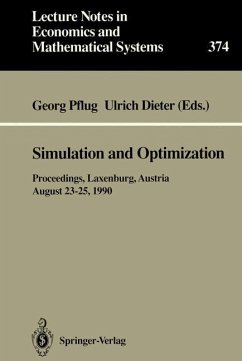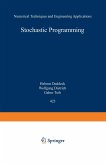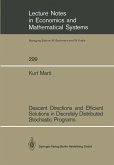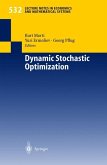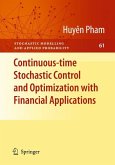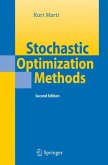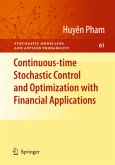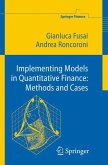This is a proceedings volume of a workshop on "Computationally intensive methods in Simulation and Optimization". The purpose of the meeting was to review and evaluate newly developed methods for combining simulation andoptimization. These methods are used for decision problems about stochastic systems like production systems or communication networks, which are too complex for being modeled in an analytic way. A simulation model for such a system is the basis for an efficient use of recursive (stochastic optimization techniques.) The volume contains selected papers from three areas:
1. Gradient techniques for discrete event simulation models
2. Stochastic optimization methods
3. Efficient random generation methods
The book contains articles dealing with competing methods like the score method, perturbation analysis and experimental design techniques. For the first time, a comparision between these techniques is made.
This volume contains selected papers presented at the "International Workshop on Computationally Intensive Methods in Simulation and Op th th timization" held from 23 to 25 August 1990 at the International Institute for Applied Systems Analysis (nASA) in La~enburg, Austria. The purpose of this workshop was to evaluate and to compare recently developed methods dealing with optimization in uncertain environments. It is one of the nASA's activities to study optimal decisions for uncertain systems and to make the result usable in economic, financial, ecological and resource planning. Over 40 participants from 12 different countries contributed to the success of the workshop, 12 papers were selected for this volume. Prof. A. Kurzhanskii Chairman of the Systems and Decision Sciences Program nASA Preface Optimization in an random environment has become an important branch of Applied Mathematics and Operations Research. It deals with optimal de cisions when only incomplete information oft.he future is available. Consider the following example: you have to make the decision about the amount of production although the future demand is unknown. If the size of the de mand can be described by a probability distribution, the problem is called a stochastic optimization problem.
1. Gradient techniques for discrete event simulation models
2. Stochastic optimization methods
3. Efficient random generation methods
The book contains articles dealing with competing methods like the score method, perturbation analysis and experimental design techniques. For the first time, a comparision between these techniques is made.
This volume contains selected papers presented at the "International Workshop on Computationally Intensive Methods in Simulation and Op th th timization" held from 23 to 25 August 1990 at the International Institute for Applied Systems Analysis (nASA) in La~enburg, Austria. The purpose of this workshop was to evaluate and to compare recently developed methods dealing with optimization in uncertain environments. It is one of the nASA's activities to study optimal decisions for uncertain systems and to make the result usable in economic, financial, ecological and resource planning. Over 40 participants from 12 different countries contributed to the success of the workshop, 12 papers were selected for this volume. Prof. A. Kurzhanskii Chairman of the Systems and Decision Sciences Program nASA Preface Optimization in an random environment has become an important branch of Applied Mathematics and Operations Research. It deals with optimal de cisions when only incomplete information oft.he future is available. Consider the following example: you have to make the decision about the amount of production although the future demand is unknown. If the size of the de mand can be described by a probability distribution, the problem is called a stochastic optimization problem.

